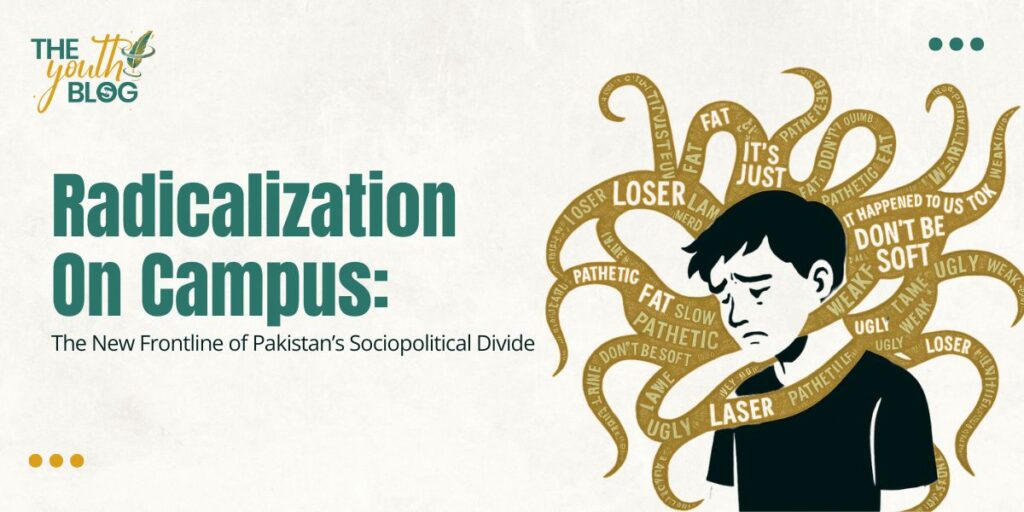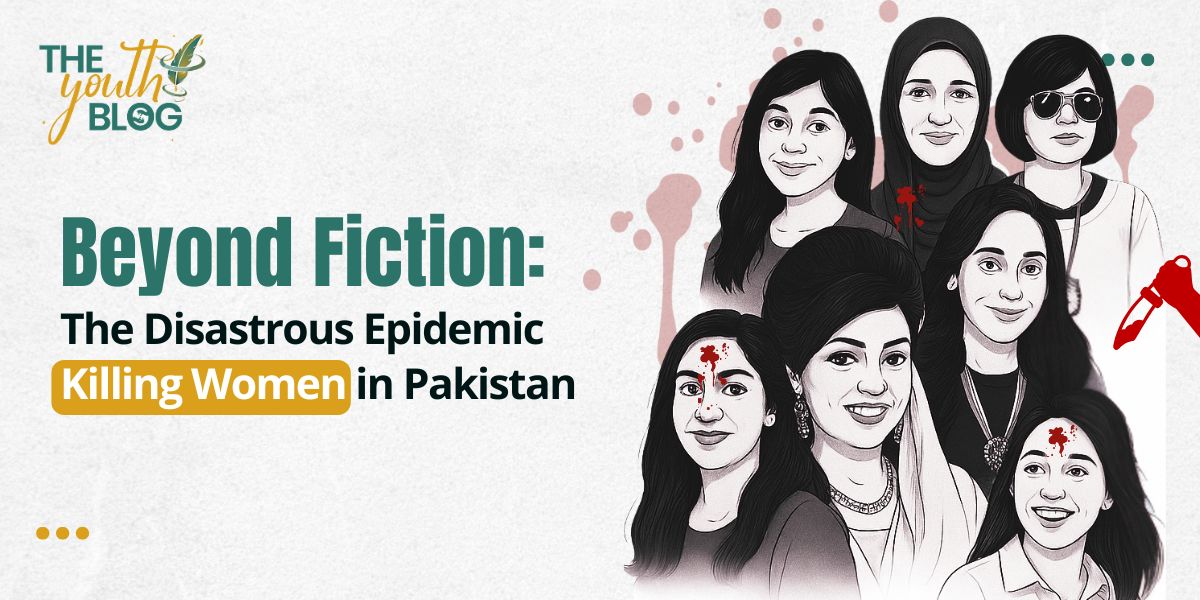
Radicalization on Campus: The New Frontline of Pakistan’s Sociopolitical Divide
A Nation at a Crossroads
As Pakistan struggles to settle the deadly clashes between political insecurity and resurgence of
terrorism, it has to concoct its strategies for something turbulently portentous: a chronic
societal efflux of extremism in the country. The plethora of sociopolitical, cultural, and
psychological enigmas has altered the idea of how societies used to aptly operate. It not only
created a puzzling ballgame for the state’s postural conflict adeptness, but a strategized
moralistic decay in the society, jagging it into socially isolated and truculent compartments.
While inviting multiple reported factors to ably contribute and blend in the mix of systematic
radicalization, extending from party grievance politics to thrill-seeking social behavior in
academic institutions.
From Ideology to Action: The Evolution of Campus Radicalization
From political incorrectness to bullying normality on campus through cyclical aggressive
remarks, systematic ragging, and intemperate outbursts for dominance assertion, to creating
an outright chaotic divergency of sociocultural and political segments in the society, all ring
alarms over the impulsive behavior of this country’s inhabitants. In educational institutions,
the intensive praxis of methodical violence for egocentric or groupthink objectives has created
a perplexed environment of not only domineering exclusivism, but a glorified manifestation of
toxic masculinity and mutated social factionalism.

Unpacking the Spectrum of Radicalization
The hierarchal chart of extremism stretches from basic peer pressure to informational
conformity, or ideological bias to political reactionism; escalatory gender antagonism to
systematic classism, all fuel incendiary remarks; display an epidemical national level crisis at
every step of our societal infrastructure. Also, the envenoming of culture wars between
different subsets of the society has led to largescale violence in the past and continues to haunt
and complicate mitigation strategies in the present.
Multilayered Catalysts and the Challenges for Administrations
Dealing with this brisking social meltdown has become complicated because it mixes up with
multiple societal ills. Starting from hate speech to impulsive echo chambers, intensified
regressive notions to disruptive social sentiments, all fan extreme scuffles both on cyber and
public grounds. Also, this multifaceted social ill is fueled by other concerning catalysts
involving socioeconomic deprivations, novelty seeking attitude, power hunger, and notoriety
building. This opens an apt gateway for terrorists and other antisocial entities to adeptly blend
in the society to ‘proselytize’ and ‘recruit’ politically charged voices. Consequently, it created a
jigsaw puzzle for law enforcers to tackle covert organized crimes, terrorist tactics by non-state
entities, and revenge seeking behavior by violent student groups, disturbing the operational
security protocols and schematics.
The issue of administrative inadvertence exhibited by the top bureaucratic brass and academic
administration to curtail extreme voices based on sectarian and ethnocentric divisions or
political devotion is a catalyst that adds fuel to fire. The absence of preemptive and affirmative
mechanisms of the top executive class to create an aperture focused to ably dispel reinforced
propagandist and extremist ideologies from socio-physical spaces has to be addressed by
incorporating a diverse set of swift jurisprudential mechanisms.
Rethinking Education: Curriculum Reform as a Tool for Deradicalization
Intensive efforts in revolutionizing educational curriculums by integrating a myriad set of
sociopolitical and national issues to deradicalize and depolarize young voices have become an
imperative social prerequisite to uphold democratic, civic, and moral practices. Despite over-
legislative periodic methods, the failures in mitigating unreasonable biases, cycles of violent
outbursts, and political imperceptivity have become an issue of ‘legislative disjuncture’ in the
country.
To understand the ambit of this sociopolitical quandary, its genesis needs to be understood
whether it is individualistic or out-and-out group concentrated, intensified either by group
influence or internalized projected narcissism. This argument not only highlights the twofold
dimension of this issue, but stresses on the extensive intermix of groupthink outbursts with
individual projections.
Putting Theories To Practice: Identity Politics and the Psychology of Extremism
The Social Identity Theory is applied by most social psychologists and analysts to dissect such
social puzzles. Especially relating it to framing bias to identity strains, socially hostile
compartments to identity-based uncontrollably aggressive groups that intensify ideological
wars. These social enigmas deftly aggravate existing uncharted fault lines and various
interpersonal issues related to cultural paranoia, identity dilemma, and social conformity. The
overall ‘need’ of gaining social acceptance, prestige, power, and recognition disrupts the cycle
of natural progression through a mutated form of Maslow’s Hierarchy of Needs which overtly
fuels political incorrectness, social alienation, and existential insecurity among students.
Zero Tolerance: The Need for a Disciplinary Overhaul
To strategically mitigate this societal turbulence and uphold social morality, reactive outbursts
and general lawlessness must be dealt with a ‘zero-tolerance’ administrative approach with far-
reaching repercussions on disciplinary violations. With no regard of campus and cyber rules,
such sensitive and impulsive activities display excessive egotistical tendencies, presence
seeking tactics, propaganda endorsement, and ideological symbolism, aiming at dehumanizing
outgroups and subverting campus laws. The use of organized violence and viewing ‘rival’
groups as a threat on ethno-political, cultural, or sectarian grounds has to be curtailed by
outrightly dismissing troublemakers and conflict promoters from academic environment
through a rigorous disciplinary framework, starting from cutting down rakish social media
pages to expelling power-hungry groups from campus.
Constructive Alternatives: Building Cross-Functional Academic Alliances
To broadly manage the hostility and constant rifts between student groups and academic
administration, a multispectral approach would integrate a win-win scenario at both ends of
the graphic split. Starting from on campus interdepartmental collaboration on sociopolitical
issues would create a conducive atmosphere for cross-functional academic ventures. The
periodic incorporation of seminars and workshops would result in forming academic alliances
and student societies from diverse disciplines, aiding to reduce interpersonal conflicts and
general aloofness among students. This would progressively extend its boundaries by certifying
or engaging students in research projects, managerial tasks, academic tours, or internships.
Read More: Humanism: The Hidden Ingredient of an Equitable Social Order?
Restoring Student Unions and Promoting Civic Engagement
Trailblazer mindset and collective grandiosity has become an escalatory issue after executive
indecision of downrightly banning student unions from functioning in the political landscape
impulsively heated the political climate. Reinforcing student clubs in academic institutions and
promoting on and off campus community-engagement activities of tree plantation drives, campus clean-up campaigns, leadership courses, and a holistic shift in media coverage of these
initiatives rather than reporting regular clashes between student groups would adeptly reduce
narrative amplification on cyber and public grounds.
Educational institutions, particularly colleges and universities, should preemptively invest in
treating this social ill before any massive outbursts jolts the social system with substantial
proportions. Such events have already taken place, and they continue to do so which highlights
the urgency of incorporating a rigorous set of administrational, educational, and communal
operational policy mechanisms to prevent politically-driven antagonistic narratives and overall
hatred between opposite groups.
Mental Health Matters: Healing the Psyche of the Student Body
Academic administration should hire campus counsellors and psychiatrists for students affected by culture shock, emotional burnout, social alienation, and overall psychological issues of mental health importance. Meanwhile, these practices should also be extended towards faculty members to undergo sessions related to mental health, civic literacy, and emotional sensitivity to tactfully address issues related to students, while ensuring strict disciplinary actions on law violations.
Hamza Chaudhry is a student of International Relations at the University of Punjab. His interest areas of research include space warfare, environmental politics, global & nuclear politics, and security issues.


